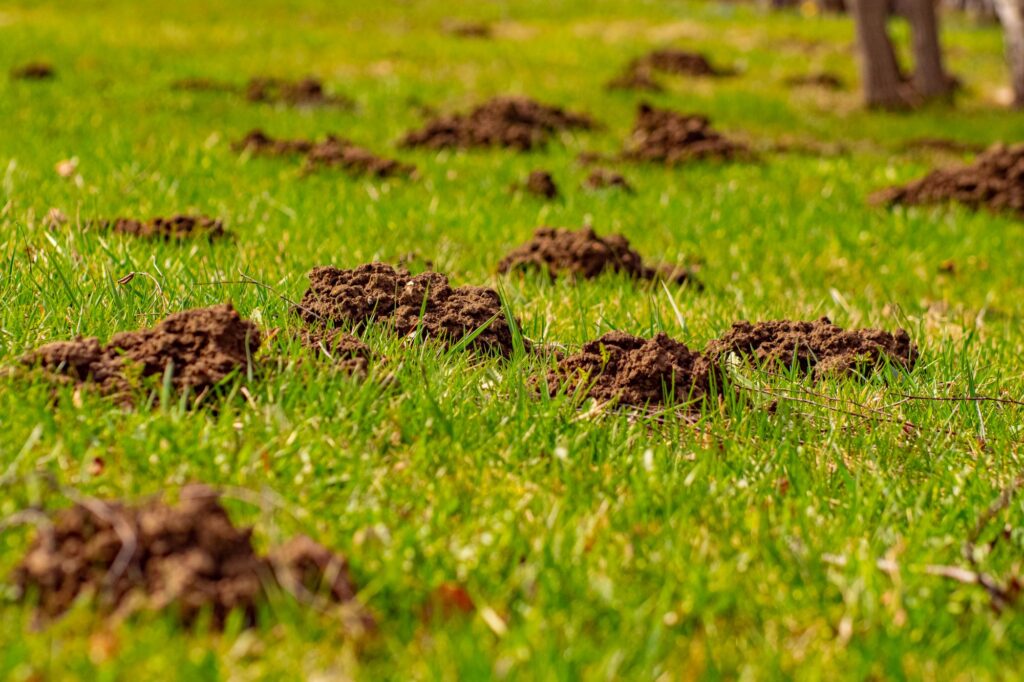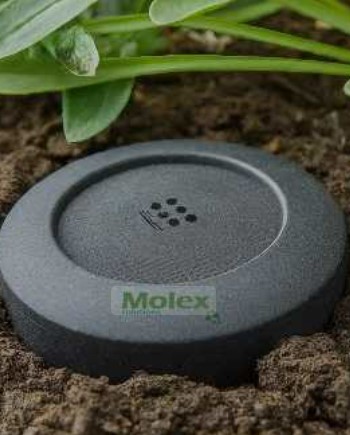It is not for nothing that there is a popular arcade game in which players try to hit toy moles as they repeatedly pop up from holes in the ground. The small mammals are indeed notorious for repeatedly tunneling under and up into open grassy areas such as fields, golf courses and even private gardens.
And while there are a wealth of solutions – some deadly, some mere deterrents – to the issue of moles and similar pests ruining gardens, none are permanent and need constant revisiting as the burrowing animals inevitably return. So much so, that homeowners can begin to feel as though they really are playing an interminable game of Whac-a-Mole.
Israeli startup Molex, however, really digs into the problem with what it says is a permanent solution in the form of an underground sound system that repels moles and other fossorial animals that burrow and live underground, by imitating their predators while not being a nuisance to humans.
“The intention is to keep rodents out of human infrastructure and to have them stay in nature safely,” Molex co-founder Ofir Mizrahi tells NoCamels. “We are protecting the plots without harming the animals.”

And moles, Mizrahi says, are found in every corner of the world – fauna wreaking havoc on flora everywhere they are present.
“It’s a global problem,” he explains. “There are very small areas in the world where you don’t have rodents – like certain islands – but it is everywhere.”
Molex’s electricity-powered disc-shaped device is placed underground in a garden or other outdoors area, from where it emits the sounds that mimic the natural predators of the moles and other fossorial animals – those which burrow and live underground.
It has to be installed by a technician, who hooks it up to an electrical grid or solar panels to power it. Molex also made sure that it operates on low voltage, to avoid any accidental incidents with electrics in a residential space where children are present. It is also the presence of children that rules out standard pest control solutions such as poison.
The device, which Mizrahi refers to as an “engine,” is buried to the depth of the tunnels created by the animals, after extensive R&D to find the optimal way to combine reach and efficacy.
The system works by utilizing the fossorial animals’ method of communication against them, imitating their habit of knocking their heads against their tunnels as a form of echolocation.
“They just create knocks, and with the sound coming back to them, they know where they are and they know if there is a predator in the area,” Mizrahi explains.
“We want to create tension so they feel that a specific area is not convenient for them, and then they’re going away.”

The moles tend not to appear when people are in the area, he says, so the device only needs to be activated via a simple app when the area is deserted. Only when standing directly next to it can the sound be heard, so it does not cause any inconvenience when installed in a residential property.
The device has a reach of about half an acre – to cover more ground, an additional box would have to be installed. And it is for this reason, Mizrahi says, that the company recently decided to focus on smaller sites such as private gardens and organic greenhouses that do not use chemicals, rather than fields for crops and golf courses, despite the demand from such locations.
“We realized that it would take time to provide the [device] to large fields,” he explains. “It’s not that our solution would not work, but it would be very expensive.”
The technology was developed by Mizrahi and co-founder Ram Benderman, a third-generation farmer who grows flowers, after the latter discovered about two years ago that moles were decimating his plants.
“He started to see mounds, and he started to see the leaves were drying in his fields,” recalls Mizrahi. Benderman turned to advisors from the Ministry of Agriculture who confirmed to him that there were moles in the area.
Sign up for our free weekly newsletter
SubscribeThe two then started to explore existing options to Benderman’s mole problem but found that none of them were effective long term.
“It was surprising for us,” Mizrahi says. “We started by ordering all sorts of devices, ultrasonic and several others. Nothing really worked, and then we realized that we needed to come up with a solution.”
Benderman (the “ideas man,” according to Mizrahi) has vast experience in developing technological devices for the Israeli defense industry. He has spent much of the 10 months since war broke out either inside Gaza or on the northern border with Lebanon, from where Iranian-backed Hezbollah terror group has been bombing swathes of the north relentlessly.
Getting to work on their product, Mizrahi and Benderman started collaborating with other Israeli farmers and the Ministry of Agriculture to refine their R&D.
“Israel is not our market,” says Mizrahi, referring to the country’s limited size, “but it’s a very good place for us to do our pilots.”

One of the Israeli farmers they are working with, he says, had moles eating their way through his passion fruit bushes and was forced to divert manpower to deal with them.
Mizrahi compared this to hunting for landmines, adding that the process reinforced the understanding that none of the solutions on the market were permanent.
“It’s time and again,” he says, pointing out that pest control services will not give assurances that they can solve the problem for good as they know that they will likely have to return within months.
The company recently completed MassChallenge Israel’s Early-Stage Accelerator Program, a four-month intensive course in Jerusalem that helps selected entrepreneurs advance their nascent companies.
“Mass challenge almost saved the business,” Mizhrai says. “After October 7 we couldn’t do the projects that we had. It was mole season in Israel – we had everything planned for the following week, and we missed it.”
It was also previously part of the European Union’s EIT Food entrepreneurship program, which supports agritech startups in the food sphere. While Molex was the only Israeli company among the 40-strong cohort, Mizrahi says, it did teach them a great deal about business possibilities in Europe.
Some of Molex’s funding came from the EU program, and some came from the Agriculture Ministry in Israel, which is keen to end its use of environmentally unfriendly poison as an answer to burrowing animals that are destroying crops.
The rest of their funds came from their own pockets and from the small number of farmers they are working with in Israel. They were in contract with a leading Israeli irrigation company but that was suspended once war broke out in October.
Molex is currently searching for a CEO/co-founder to expand the company’s reach abroad, including cooperation with irrigation companies whose subterranean infrastructure is also being devastated by moles and their ilk.
The company also plans to make the device into a complete kit that anyone can install themselves without input from an expert. And, as a gesture to the moles they so efficiently drive away, even create feeding stations where the banished beasts can recover from their encounter with a pseudo predator.
Related posts

Harnessing Our Own Bodies For Side Effect-Free Weight Loss

Israeli Device Is New, Drug-Free Solution For Men Coping With ED





Facebook comments